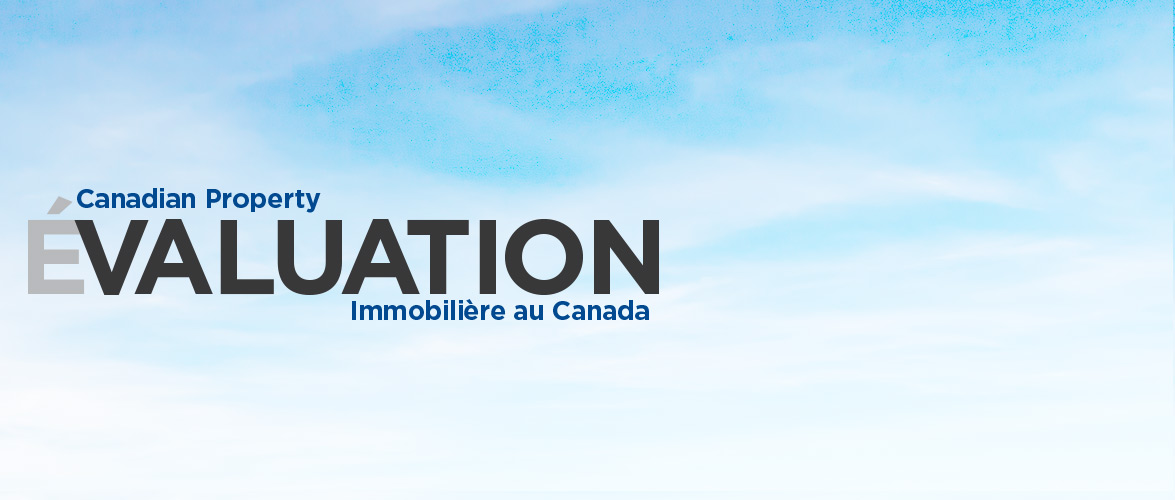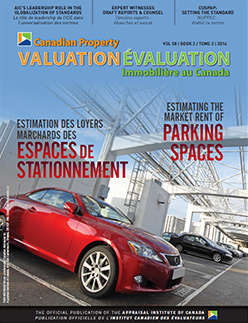Professional Practice Matters – CUSPAP: setting the standard
Canadian Property Valuation Magazine
Search the Library Online

By Nathalie Roy-Patenaude, AACI, P. App.
AIC Director-Counsellor, Professional Practice
“CUSPAP deals with the procedures for the development and communication of formal analyses, opinions and conclusions, and incorporates the minimum mandatory content necessary to produce credible reports that will not be misleading.”
The Appraisal Institute of Canada (AIC) released the biennial edition of the Canadian Uniform Standards of Professional Appraisal Practice (CUSPAP 2014), which came into effect April 1, 2014. The Standards respect the expanding role of the valuation professional within Canada and internationally through AIC’s endorsement of the International Valuation Standards. AIC Members’ compliance to CUSPAP distinguishes them as professionals adhering to a stringent set of Rules and Comments relating to ethics, as well as appraisal, review, consulting and Reserve Fund Planning assignments.
Key changes to CUSPAP 2014 include enhanced Definitions (which are compulsory), enhanced Practice Notes (intended to offer advice, examples and resolution; their application is not compulsory) and a fifth standard dedicated to the practice of Reserve Fund Planning. CUSPAP has long recognized Reserve Fund Studies as a consulting activity. Until the release of CUSPAP 2014, the CRA scope of practice was limited to individual undeveloped residential dwelling sites and dwellings containing not more than four self-contained family housing units. New to CUSPAP 2014 is a standalone Reserve Fund Planning Standard, with compulsory Rules and Comments and an expanded scope of practice for CRA-Designated Members. When it comes to scope, Ethics Standard Comment 5.5.5 is clear:
“5.5.5 CRA Members must use that designation in connection with the appraisal, review or consulting on individual undeveloped residential dwelling sites and of dwellings containing not more than four (4) self-contained family housing units…
5.5.5.i. Exception is for reserve fund planning assignments whereby competent CRA Members can use the CRA designation to undertake reserve fund planning assignments on any building size.”
At the core of CUSPAP, and for any professional service defined under CUSPAP and recognized under AIC’s professional liability insurance program, AIC Members are required to:
- apply their practice in a manner that is consistent with the ‘Reasonable Appraiser’ standard – the test of record in professional practice matters that has been referred to, either directly or indirectly, in a number of court decisions;
- have the competence to undertake any assignment; and,
- comply with the applicable legislative and/or licensing requirements for all types of professional services assignments. In some jurisdictions, legislation may also limit the qualifications of the practitioner and AIC Members must be mindful that legislation supersedes CUSPAP.
CUSPAP deals with the procedures for the development and communication of formal analyses, opinions and conclusions, and incorporates the minimum mandatory content necessary to produce credible reports that will not be misleading.
At the core of any appraisal assignment are the valuation methodologies and the requirement for the appraiser to comply with 25 Appraisal Standard Rules including:
- 6.2.15 describe and analyze all data relevant to the assignment; [see Appraisal Standard Comment 7.2.16]
- 6.2.16 describe and apply the appraisal procedures relevant to the assignment and support the reason for the exclusion of any of the usual valuation procedures; [see Appraisal Standard Comment 7.2.17]
- 6.2.17 detail the reasoning supporting the analyses, opinions and conclusions of each valuation approach. [see Appraisal Standard Comment 7.2.86]
Complementary to those Rules and compulsory in application are the relevant Appraisal Standard Comments, whereby the appraiser must, among other things, take reasonable steps to ensure that the information and analyses provided are sufficient for the client and intended users to adequately understand the rationale for the opinion and conclusions. These three rules have been identified as common shortcomings in both form and narrative reports, and are among the most sanctioned CUSPAP violations under the disciplinary process. In the absence of clear and comprehensive analyses and relevant comments, clients and intended users can be left trying to understand the author’s rationale and unable to make sound and well-informed decisions. It is about “telling the story.” To quote the decision in Kokanee Mortgage MIC Ltd. v. Concord Appraisals Ltd. 2000 BCSC [Kokanee] 1197 at para. 55:
“…real estate appraisal is a matter of judgement and not a precise science. However…a person relying on…an appraisal is…entitled to expect that judgement to be exercised within acceptable standards of skill and expertise, and to be based on rational assumptions.”
The acceptable standard is determined by the actions of peers and the expectations of regular intended users and the industry for similar professional services; it is not the practitioner’s personal interpretation or firm’s practice.
Reliability of a report and credibility of its author lies in the author’s ability to effectively communicate to the reader, client and intended user his or her thinking process and demonstrate his or her competence through the application of the appraisal procedures relevant to the assignment. Members must stay abreast of the teachings and refer to the body of knowledge to ensure their practice remains fresh and within an acceptable standard of skill and expertise.
While CUSPAP provides the minimum ethical and practical expectations for any assignment, it is intended to define principles that reflect high standards of professionalism. Compliance to CUSPAP is AIC’s and AIC Members’ contract with the public we serve. It is what sets us apart, nationally and internationally, and positions us as professionals of choice. CUSPAP 2014 can be downloaded from AIC’s website at https://www.aicanada.ca/professional-standards/.
Questions can be directed to Nathalie Roy-Patenaude, AACI, P. App., AIC Director-Counsellor, Professional Practice at .





